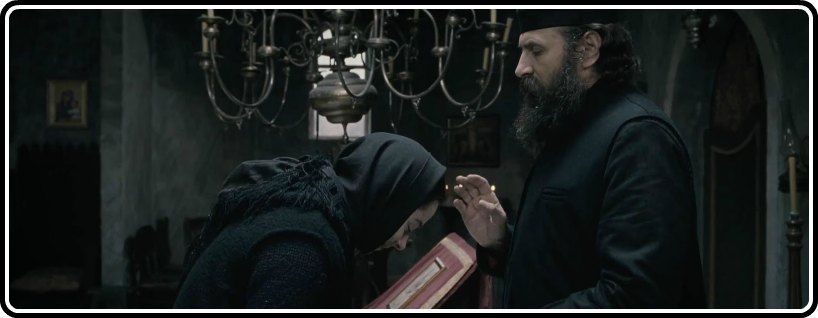
Romanian Cristian Mungiu’s 2007 abortion drama 4 Months, 3 Weeks and 2 Days was a devastating and tense film. Quiet, grim and full of multiple layers of discomfort for it’s characters safety, it felt realistic and emotionally truthful. Mungiu’s newest film Beyond the Hills aims for (but ultimately fails to reach) a similar emotional place in a wholly different setting.
Two young women, Alina and Voichita are former orphanage classmates and lovers whose paths have split. Alina leaves her home in Germany and arrives at a highly conservative Orthodox monastery in the Romanian hills where Voichita has found peace as a devout nun. Much of the tension in the first half of the film surround Alina begging her friend to flee to Germany with her. Voichita then explains that she has found her calling in the primitive church, serving God day and night.
The monastery is run by a strict but not unkindly priest, the lone male in a tiny village of black clad women. As Alina becomes increasingly desperate and panicked for her former lover her behavior grows erratic and psychotic. After an arson, fits of rage and a suicide attempt the nuns take Alina to the local hospital, only to be sent back the the monastery by the doctors after several days. When Alina again becomes violent, the priest and his nuns fear she might be possessed by an evil spirit. They then strap her to a wooden cross-shaped stretcher with chains, gag and starve her and perform prayers and exorcism rites for several days.
Like his previous films, Beyond the Hills is absorbing, authentic, cold and quiet. It has no score and even dialogue is kept at a mostly calm clip. That is – until the final reel when the nuns are suddenly buggy-eyed hens nervously and spiritually “treating” the monastery’s manic guest. The photography is nearly monochromatic, beautifully rendering the harsh Romanian country landscape in Winter. Set in modern day the film feels like a period piece, filled with frosty scenes of potato and onion slicing, snow shoveling, and fetching water from the well. It’s only when the film takes occasional breaks to visit the hospital in town and we see modern clothing and cars do we remember how out-of-time these servants of God are.
In the early scenes I had expected to eventually see a great deal of dread and human wickedness from the characters, particularly the Father of the monastery. Somewhat surprisingly, Mungiu (who also wrote the film) retains the logic and humanity of his subjects and thus keeps our sympathies reasonably balanced from character to character. It might’ve been easy to demonize (pardon the pun) the chief Priest and ultimate instigator of the torture of this woman. But in the end the man comes across more ignorant and intensely misguided instead of evil. He is given multiple moments throughout the film to voice his concerns over Alina’s well being, though his role in her trauma cannot be judged as anything but his fault.
Beyond the Hills is not quite as “heavy” as it appears (though it is overlong at 150 minutes), but is emotional and deliberate. I enjoyed it, but it departed from my mind a bit quickly as I exited the screening, which is not a terribly great trait for a Romanian demon possession drama. Though for admirers of religious period films or Mungiu’s previous work, one could do a lot worse than this quiet and striking movie.



![Bergman Island (The Criterion Collection) [Blu-ray]](https://criterioncast.com/wp-content/uploads/2022/11/bergman-island-the-criterion-collection-blu-ray-400x496.jpg)
![This Is Not a Burial, It’s a Resurrection (The Criterion Collection) [Blu-ray]](https://criterioncast.com/wp-content/uploads/2022/11/this-is-not-a-burial-its-a-resurrection-the-criterion-collection-blu-ray-400x496.jpg)
![Lars von Trier's Europe Trilogy (The Criterion Collection) [The Element of Crime/Epidemic/Europa] [Blu-ray]](https://criterioncast.com/wp-content/uploads/2022/11/lars-von-triers-europe-trilogy-the-criterion-collection-the-element-of-400x496.jpg)
![Imitation of Life (The Criterion Collection) [Blu-ray]](https://criterioncast.com/wp-content/uploads/2022/11/imitation-of-life-the-criterion-collection-blu-ray-400x496.jpg)
![The Adventures of Baron Munchausen (The Criterion Collection) [4K UHD]](https://criterioncast.com/wp-content/uploads/2022/11/the-adventures-of-baron-munchausen-the-criterion-collection-4k-uhd-400x496.jpg)
![Cooley High [Criterion Collection] [Blu-ray] [1975]](https://criterioncast.com/wp-content/uploads/2022/11/cooley-high-criterion-collection-blu-ray-1975-400x496.jpg)